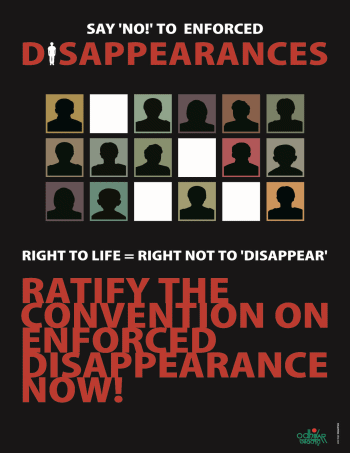Joint Press Release
Paris-Dhaka, 23 February 2012. The International Federation for Human Rights (FIDH) and its member organization in Bangladesh, Odhikar, are deeply concerned by the adoption on 16 February by the Parliament, the Jatiya Sangsad, of the Anti-Terrorism (Amendment) Bill which widens the scope of sanctions provided in the Anti-Terrorism Act of 2009 (ATA) by approving the death penalty as the maximum penalty for financing terrorist activities.
Before the amendment, the ATA stipulated that the offence of financing acts of terrorism shall be punishable by not more than 20 years and not less than three years of imprisonment. The Amendment Bill also retains the death penalty as the maximum penalty for terrorist activities. It also provided scope to prohibit the use of Bangladeshi land for the conduct of any terrorist activities inside the country or against other countries, all types of illegal arms and explosives, and the creation of ‘panic’ among the people through any terrorist activities. The Amendment Bill was passed with virtually no consultation with, and despite strong opposition from, Bangladeshi civil society groups.
In a joint report in October 2010, entitled Bangladesh: Criminal justice through the prism of capital punishment and the fight against terrorism, FIDH and Odhikar raised their long-standing serious concerns that the vague definitions of ‘terrorists activities’ under the ATA open the legislation to potential abuse and are incompatible with the principle of legality requiring that criminal liability and punishment be limited to clear and precise provisions. This principle is enshrined in Article 15 of the International Covenant on Civil and Political Rights (ICCPR), which Bangladesh has ratified.
By retaining vague and broadly applicable definition of ‘terrorist activities’ and reducing ‘terrorism’ to merely a question of crime punishable by death, the Amendment Bill makes the Anti-Terrorism Act even more vulnerable to the worst kind of abuses, said FIDH and Odhikar. The monitoring work of FIDH and Odhikar over the years has indicated a large potential for abuse and violations of due process in the criminal justice system in Bangladesh. The widening of the scope of crimes
punishable by death thus carries the tremendous risk of irreversible miscarriage of justice. The Act of 2009 has already been abused by the government to repress political opponents, journalist and other dissenting voices.
“When the Anti-Terrorism Ordinance was first promulgated by the military-backed Caretaker Government, we already raised concerns regarding its potential for abuse, which proved to be true as we have witnessed a trend of persistent criminalisation of popular dissents and the tendency to reduce complex social, economic, political and cultural grievances into a purely criminal matter,” said Adilur Rahman Khan, Secretary of Odhikar. “The Amended Bill as it stands now will be more repressive and by its very nature might turn into a nightmare of abuse and violence jeopardizing social and political stability, instead of strengthening human security.”
“Punishing the financing of terrorist activities by death goes against the general tendency to restrict capital punishment to only the most serious crimes pending its eventual abolition,” said Souhayr Belhassen, FIDH President. “The government should make sure that any measures it 2 takes to combat terrorism comply with all of its obligations under international law, in particular international human rights law, refugee law, and humanitarian law, keeping in mind that for any counter-terrorism strategies to be effective, they must strengthen, rather than weaken, the rule of law.”
FIDH and Odhikar call on the Bangladeshi government to:
- Amend or repeal the Anti-Terrorism Act and the Amendment Bill and conduct a comprehensive review of existing legislation to ensure their compliance with international standards and law and promoting and protecting human rights and fundamental freedom while addressing terrorism;
- Ensure that genuine and broad-based consultations are held with the public, human rights defenders, and other relevant stakeholders to address the problem of terrorism without reducing the complex social, economic, political and cultural grievances into a purely criminal matter;
- Extend an invitation for a country visit by the UN Special Rapporteur on the promotion and protection of human rights and fundamental freedoms while countering terrorism.
Press contact:
FIDH: Arthur Manet + 33 1 43 55 14 12 / + 33 1 43 55 25 18
Odhikar: ASM Nasiruddin Elan + 88 02 9888587
For more on our work on Bangladesh, please visit:
http://www.fidh.org/-Bangladesh,596-
https://www.odhikar.org/




